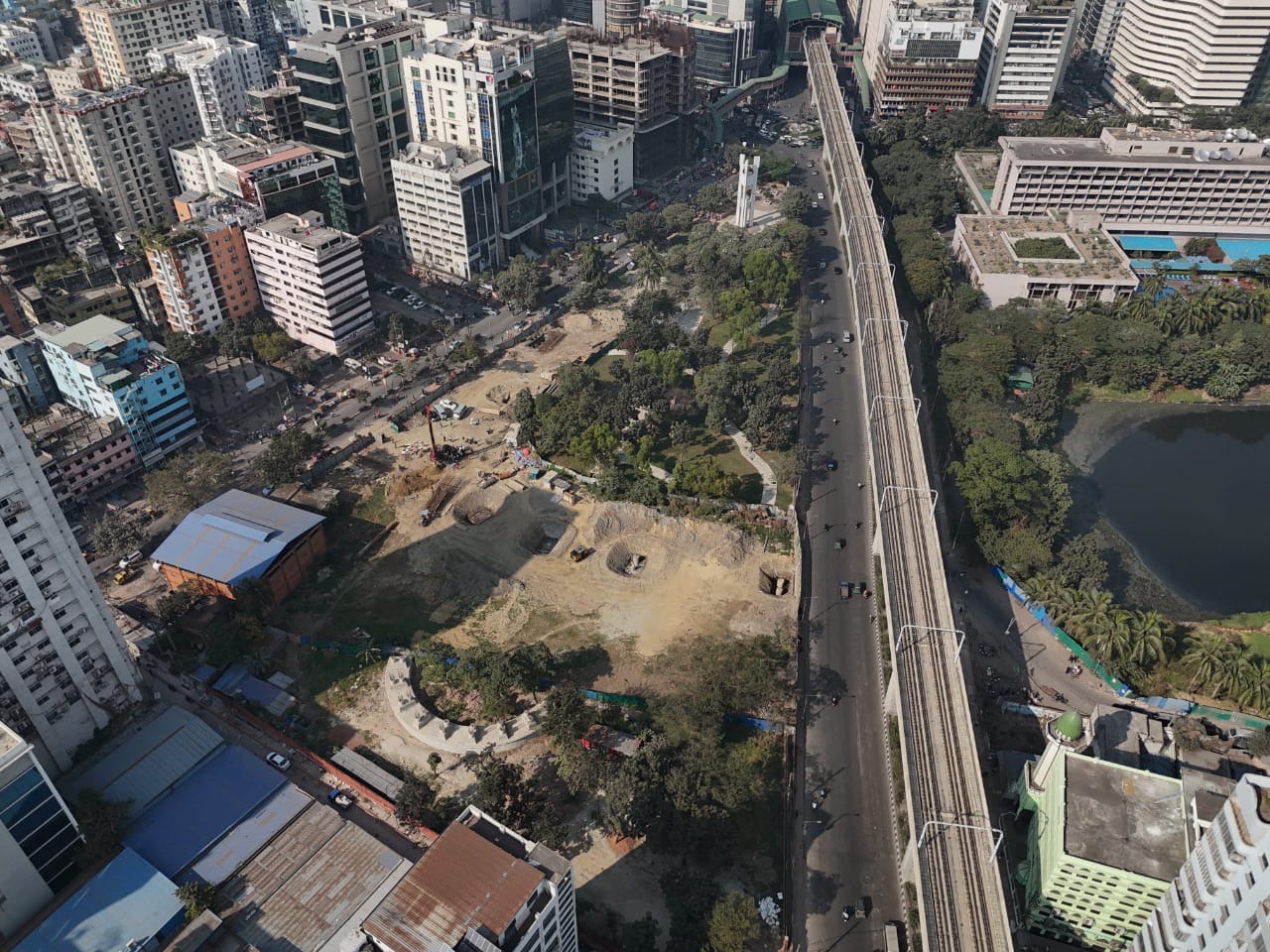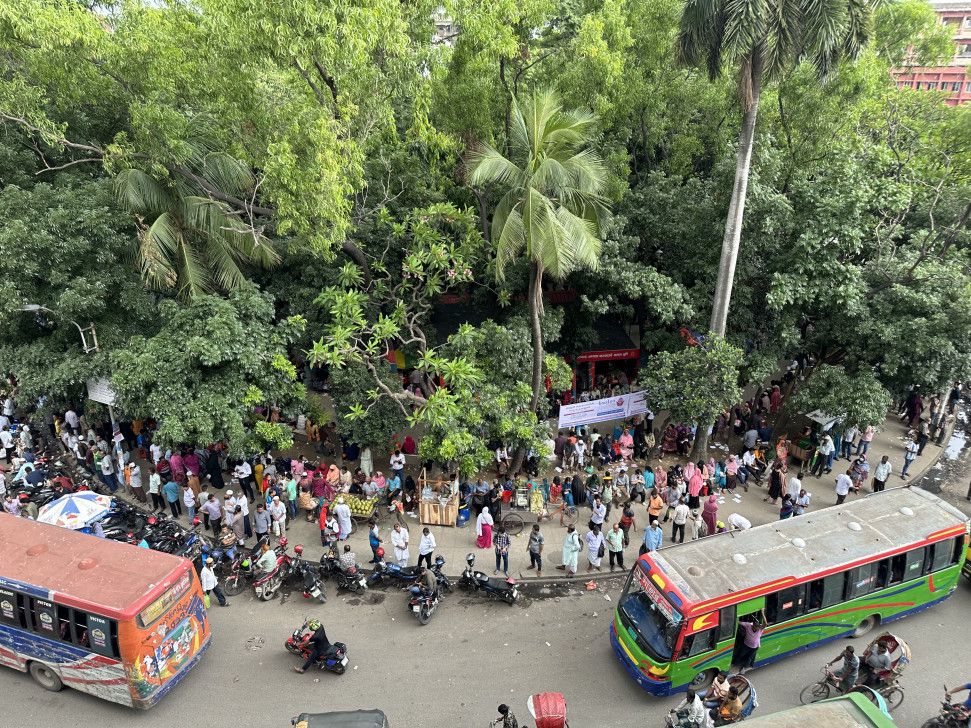Government must save Panthakunja from the pillars of development

The previous government spent thousands of crores of taka on various mega infrastructure projects to decongest Dhaka. But instead of solving Dhaka's traffic congestion problem, these projects led to a decrease in the average speed of vehicles, encouraging private car movement. One such project is the Dhaka Elevated Expressway project which is under construction in the Public Private Partnership (PPP) model.
The main purpose of constructing an expressway is usually to bypass the congested city. For this reason, the number of ramps inside the city is kept to a minimum. Initially, similar plans were made for the Dhaka Elevated Expressway. It was said that vehicles coming from the northern region would bypass Dhaka city and travel to the southern and southwestern regions by using this elevated expressway, thereby reducing the traffic pressure on the internal roads of Dhaka.
But in reality, the opposite has been done. As the road is being constructed by foreign private companies in the PPP model, a large number of ramps have been constructed at various places within Dhaka city to collect more tolls for the companies' commercial interests. As a result, more and more cars are coming down the ramps at faster speeds increasing the traffic congestion.
This became clear soon after the Kawla to Tejgaon section of the expressway was opened for vehicle movement in September 2023. It has been observed that the expressway is being used almost exclusively by private cars and since these vehicles are coming down from the northern part of Dhaka at Farmgate at great speed, Farmgate has become the new centre of Dhaka's traffic jam. But even then, the construction of more ramps from the expressway did not stop. Under "Support to Dhaka Elevated Expressway PPP Project," an initiative was taken to construct a connecting road from Moghbazar Rail Crossing to Sonargaon Hotel, Panthakunja, Hatirpool, Kantabon, Dhaka University to Palashi Mor. As part of this, a part of Hatirjheel has already been filled and many trees of Panthakunja Park have been cut down to build expressway ramps.
It was expected that the current interim government would re-evaluate the various megaprojects, including the elevated expressway project, that had damaged the environment and went against public interest during the Hasina government's tenure. But even during this government's tenure, the work of elevated expressway is going on and parks and waterbodies are being destroyed as before. Not only that, even after more than a month of joint movement by various individuals, organisations and experts including the Bangladesh Tree Protection Movement, the government is doing nothing to cancel the works.
It is noteworthy that several advisers of this government were vocal during the previous regime in protecting the environment including trees, playgrounds, waterbodies, and parks. They have opposed the construction of any kind of structure in public parks and playgrounds across the country including Dhaka through their speeches, statements, and writings.
For example, Syeda Rizwana Hasan, adviser to the Ministry of Environment, Forest and Climate Change, expressed solidarity with the movement against the construction of a police station in the Tentultala field of Kalabagan in the capital in 2022. On April 26, 2022, she pointed out how dysfunctional the urban planning of a country can be, that people have to stage protests to save playgrounds! In February 2023, she demanded the removal of commercial establishments built or under construction in Dhaka's Dhupkhola Ground, Bahadur Shah Park and Gulshan Shahabuddin Park and other parks and grounds. In a joint statement, she reminded the government about the Preservation of Playgrounds, Open Spaces, Parks and Natural Water Bodies Act, 2000. According to this Act, the use of playgrounds, open spaces, parks and natural water bodies in any other way is prohibited. She also raised the question, is earning money or profit the main goal of the city's institutions and authorities? Is creating an ideal environment for people to live, absolutely secondary to them?
Muhammad Fouzul Kabir Khan, adviser to the Ministry of Road Transport and Bridges under whose supervision the expressway is currently being built, has also written in favour of environment and sustainable development. Just two years ago, in January 2023, he took up the pen opposing the establishment of a coffee shop in Gulshan's Shahabuddin Park. Protesting against setting up coffee shops in parks, he wrote in a satiric tone: "Gulshan's Shahabuddin Park is going to have the honour of perhaps setting up the world's first coffee shop in a public park!"
He used two arguments against setting up coffee shops in public parks: i) establishing a coffee shop inside the park will limit public access to certain parts of the park; ii) the coffee shop is not compatible with the purpose of the park. We need not remind him that both these arguments can also be applied against the construction of Dhaka Elevated Expressway ramp at Panthakunja Park.
Despite having such pro-environment advisers in the cabinet of the current government, the construction of this link road, which is destroying the Hatirjheel and Panthakunja Park, is continuing. Adviser Muhammad Fouzul Kabir Khan said on the 11th day of the continuous sit-in programme of the Tree Protection Movement to protect Panthakunja Park: "A decision has already been made. It is not possible to stop the construction of the Karwan Bazar to Palashi section of the expressway. Now we will think about how development work can be done by keeping trees. You try to understand. What has happened here has to be accepted. Listen to what I have to say. If you don't listen, I will leave."
What might be the reason for this attitude? Would stopping the construction of the link road at this stage hurt the interests of foreign companies by undermining their investment in the expressway? Perhaps if the pillars and ramps are not allowed to be built by destroying the park and Hatirjheel, the elevated expressway will have less traffic, resulting in less revenue for investor companies. So, is the construction of the ramp being allowed at the cost of the Panthakunja Park and Hatirjheel to keep the interest of the investing company intact? However, to protect public interest and the environment, the elevated expressway agreement, like many other anti-people agreements signed by the previous government, should be re-evaluated and revised.
The interim government must prove that they are not a follower of the destructive development model of the past autocratic regime. But it is difficult to be optimistic about the government's behaviour so far. It is very sad that the government has not changed its stance even after the activists of the Tree Protection Movement have been staging sit-in protests at the Panthakunja Park for more than 40 days demanding a stop to the environmental destruction, an initiative the government should have itself taken.
Kallol Mustafa is an engineer and writer who focuses on power, energy, environment and development economics. He can be reached at kallol_mustafa@yahoo.com.
Views expressed in this article are the author's own.
Follow The Daily Star Opinion on Facebook for the latest opinions, commentaries and analyses by experts and professionals. To contribute your article or letter to The Daily Star Opinion, see our guidelines for submission.




 For all latest news, follow The Daily Star's Google News channel.
For all latest news, follow The Daily Star's Google News channel. 


Comments